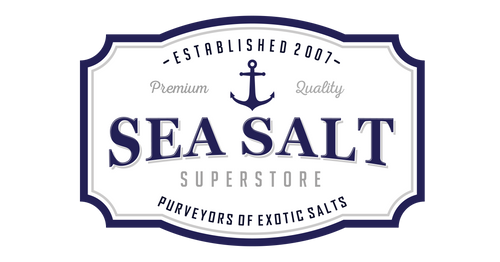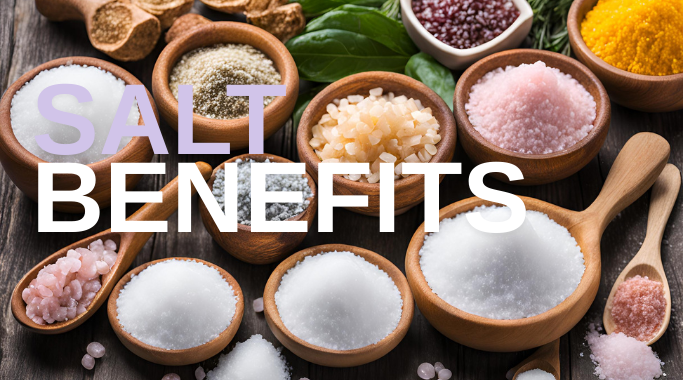When it comes to seasoning food, most of us turn to salt, but with the variety of salts available on the market today, it can be hard to know which one is best for your health. Two of the most commonly used salts are sea salt and table salt. While they may seem similar in many ways, they differ in terms of mineral content, processing, and potential health benefits. Here’s a closer look at both salts and how they compare in terms of health.
1. What is Sea Salt?
Sea salt is derived from the evaporation of seawater. It’s generally produced in coastal areas where seawater is collected and evaporated through natural processes, often under the heat of the sun. Unlike table salt, which is typically mined from underground salt deposits, sea salt is minimally processed and retains a variety of trace minerals, depending on its source. These can include magnesium, calcium, potassium, and iron, which give the salt its distinctive flavor and color.
Because sea salt is less refined, it typically has larger, coarser crystals that can add texture to dishes when used as a finishing touch. It also has a more complex, natural flavor compared to the often more straightforward taste of table salt.
2. What is Table Salt?
Table salt is the most common form of salt used in homes and restaurants. It is mined from underground salt deposits and goes through extensive refining to remove impurities and trace minerals. This refining process leaves behind nearly pure sodium chloride, with little to no trace of the minerals found in natural salts like sea salt. Table salt often contains additives like iodine (to prevent iodine deficiency) and anti-caking agents (to ensure that it flows freely).
Table salt has a much finer texture compared to sea salt, which makes it dissolve more quickly in food. While it’s cheaper and more widely available, its heavy processing strips it of the natural minerals that some people seek in their salt.
3. Health Benefits of Sea Salt
Mineral Content:
One of the key advantages of sea salt is its mineral content. Depending on the source, sea salt can contain trace minerals like magnesium, calcium, and potassium, all of which are essential for the body’s functions. For example, magnesium is known for supporting muscle function and reducing cramps, while potassium helps maintain healthy blood pressure levels. While these minerals are present in only small amounts in sea salt, they still contribute to its potential health benefits when used as part of a balanced diet.
Lower Sodium Content:
Some varieties of sea salt, especially those with larger crystals, may provide a more intense flavor, which can lead you to use less salt overall. Using less salt means that you can reduce your sodium intake, which is beneficial for heart health, especially if you're managing blood pressure. However, the sodium content in sea salt and table salt is fairly comparable, so it’s important to still use it in moderation.
Natural and Less Processed:
Because sea salt undergoes minimal processing, it retains more of the natural elements found in seawater. Many people prefer sea salt because it’s a more natural, less industrially processed product, which aligns with trends toward more organic, whole foods. The absence of additives like anti-caking agents in sea salt makes it a cleaner option for those looking to avoid unnecessary chemicals in their diet.
4. Health Benefits of Table Salt
Iodine Fortification:
Table salt is often iodized, meaning it has added iodine, a vital nutrient that the body cannot produce on its own. Iodine is essential for proper thyroid function and hormone regulation. In some regions, where iodine deficiency is common, iodized salt has been a key public health measure to prevent conditions such as goiter, hypothyroidism, and developmental issues in children. If you live in an area where iodine-rich foods (like seafood and dairy) are not readily available, iodized table salt may be an important source of this essential mineral.
Readily Available and Consistent:
Because table salt is highly refined, it is very consistent in terms of texture, flavor, and sodium content. For individuals who require a precise level of sodium, particularly those on a low-sodium diet, the uniformity of table salt can make it easier to track and control sodium intake.
Affordable and Convenient:
Table salt is much cheaper than many specialty salts, including sea salt. It’s also widely available and dissolves easily in cooking, making it a staple for many households. Its fine grains allow for easy measurement and use in cooking and baking.
5. Which Salt is Healthier: Sea Salt or Table Salt?
While both sea salt and table salt are essentially made up of sodium chloride and have similar health implications if used in excess, sea salt does offer a few distinct advantages:
Mineral Content: Sea salt provides trace minerals that may support overall health. These minerals are beneficial in small amounts, but they should not be relied upon as a primary source of nutrition.
Less Processing: Sea salt’s minimal processing makes it a more natural option, free from additives and chemicals like anti-caking agents.
However, table salt offers a clear health benefit due to its iodine content, which is vital for thyroid health and preventing iodine deficiency. If your diet lacks iodine-rich foods, table salt may be an important option.
In terms of sodium content, both salts are fairly similar, so it's important to control your total salt intake regardless of the type you use. Excessive sodium intake can contribute to high blood pressure, heart disease, and stroke, so moderation is key.
Conclusion
Both sea salt and table salt have their advantages and disadvantages. Sea salt may be preferred for its natural, less processed nature and trace minerals, while table salt is essential for its iodine content and uniformity. The best choice ultimately depends on your dietary needs and personal preferences. Regardless of which type of salt you use, remember that salt should be consumed in moderation as part of a balanced diet to avoid the negative effects of excessive sodium intake.




